#discourse studies
Explore tagged Tumblr posts
Text
"Caitlyn never verbally apologized" no, she did so much more than that.
She betrayed Ambessa. She let Jinx go. She led the battle against Ambessa in the finale. She lost an eye and nearly died. She gave up her seat on the council to Sevika so that Zaun could be represented.
Does it fix everything? No. Systems of oppression aren't fixed with a handful of well intentioned actions.
But Caitlyn DID feel remorse and DID make attempts to reverse her wrongdoings.
Did you want Caitlyn to change, or did you just want her to be punished?
#caitlyn kiramman#arcane#arcane thoughts#arcane analysis#arcane discussion#arcane discourse#character study#character analysis#arcane character analysis
3K notes
·
View notes
Text
“The Barbie movie is like basic gender studies 101. It’s like the bare minimum for feminism”
YEAH SOME PEOPLE HAVENT TAKEN GENDER STUDIES 101 AND WOULDNT YOU AGREE WE ARE CURRENTLY AT LESS THAN THE BARE MINIMUM FOR FEMINISM?
things do not need to be perfect to be good. You cannot teach someone intersectionality if that person has not heard of bare minimum feminism. You might be on step 100 but just because you started earlier does not mean that everyone can jump to your level. They have to climb the stairs too. And the people at the top yelling down to the people at the bottom that being at the bottom is bad, they need to be at the top, IT DOES NOT ENCOURAGE THEM TO CLIMB UP.
#barbie#feminism#intersectionalfeminist#intersectionality#discourse#barbie movie#greta gerwig#margot barbie#ryan gosling#gender#gender studies#college#eduction
12K notes
·
View notes
Text
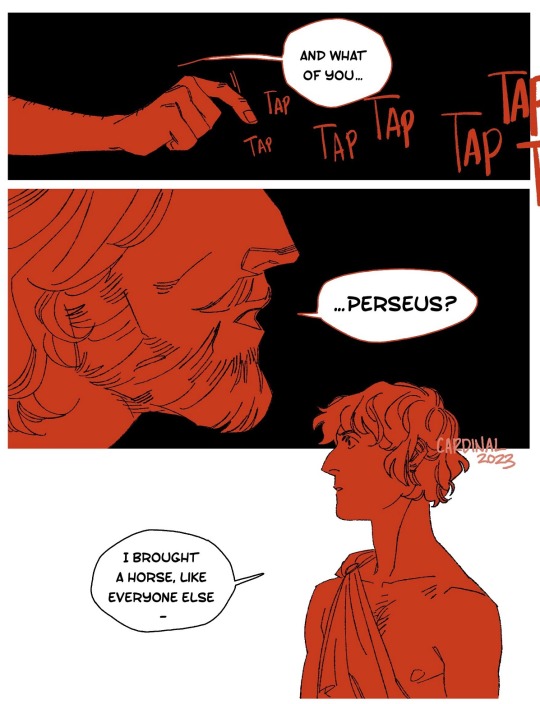
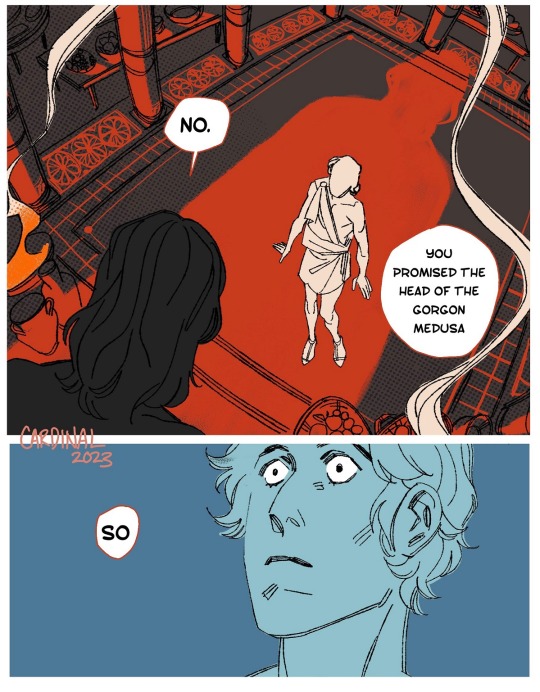
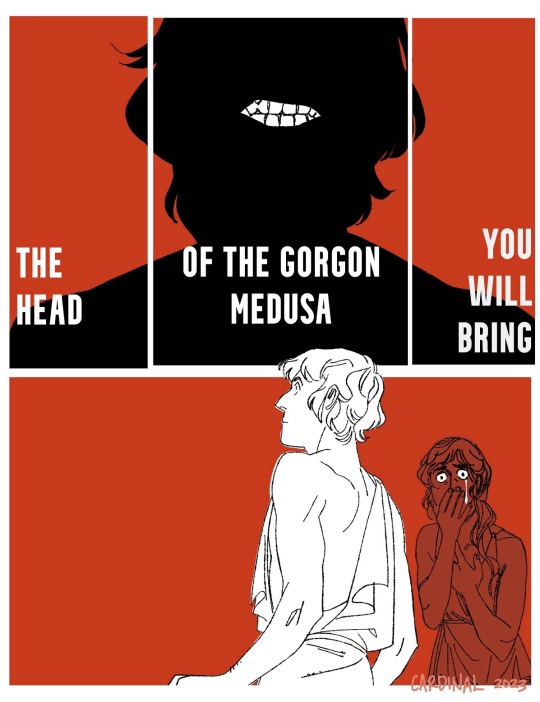
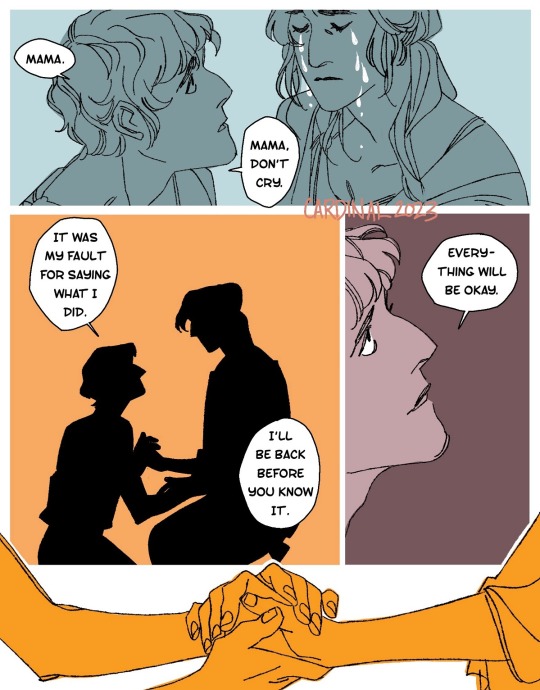
something. about. the horror of being sent on an impossible (death) quest and obligations and hospitality politics. the trauma of not having a home, and then the trauma of being in a house that becomes actively hostile to you, one that would swallow you whole and spit out your bones if you step out of line. all of this is conditional, your existence continues to be something men want gone.
it's about going back as far as I can with the perseus narrative because there's always a version of a myth that exists behind the one that survives. the missing pieces are clearly defined, but the oldest recorded version of it isn't there! and there's probably something older before that!! but it's doomed to forever be an unfilled space, clearly defined by an outline of something that was there and continues to be there in it's absence.
and love. it's also about love. even when you had nothing, you had love.
on the opposite side of the spectrum, this is Not About Ovid Or Roman-Renaissance Reception, Depictions And Discourses On The Perseus Narrative.
edit: to add to the above, while it's not about Ovid, because I'm specifically trying to peel things back to the oldest version of this story, Ovid is fine. alterations on the Perseus myth that give more attention Medusa predate Ovid by several centuries. this comic is also not about those, either! there are many versions of this story from the ancient world. there is not one singular True or Better version, they're all saying something.

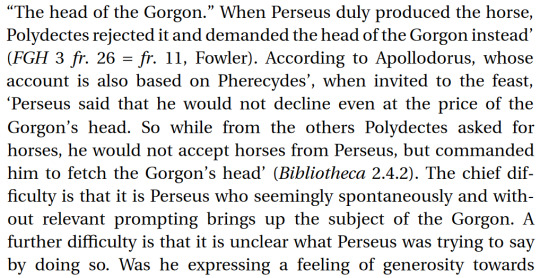
Perseus, Daniel Ogden

Anthology of Classical Myth: Primary Sources in Translation, edited & translated by Stephen M Trzaskoma, R. Scott Smith, Stephen Brunet
#perseus#danae#komiks tag#long post#every other week i start to say something about how greek heroes are a good case study in diaspora and exile trauma#but man perseus makes me so sad. so does danae. she loves her son :(#perseus turning a whole island to stone is a huge mood. i would also do that if i were him#anyway (salutes) take care everyone i gotta watch yunho's new video it looks like a fucking movie im so excited#(i singled out ovid bc i remember the fucking shit perseus discourse that ran through this site. i remember#im preemptively loading a gun and pointing at it before it can touch this post#it hasn't died out either i see it on twitter all the time in the most ANNOYING ways possible i am TIRED#esp bc they're actually doing medusa a narrative disservice like congrats! you made it worse! stop telling me it's better!!!!)#ancient greece tag
7K notes
·
View notes
Text
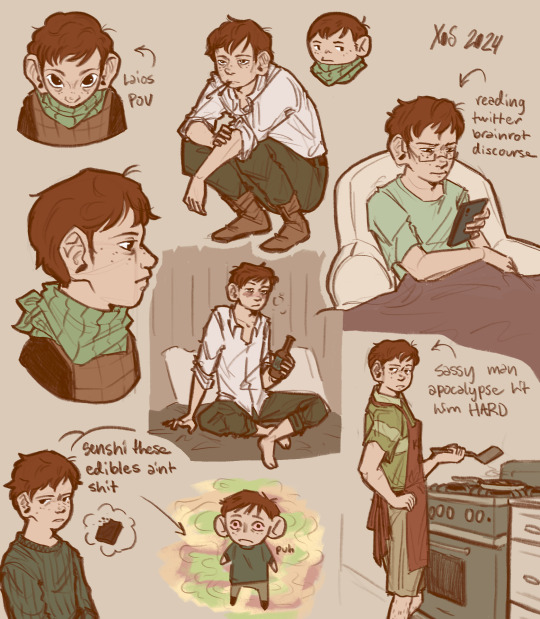


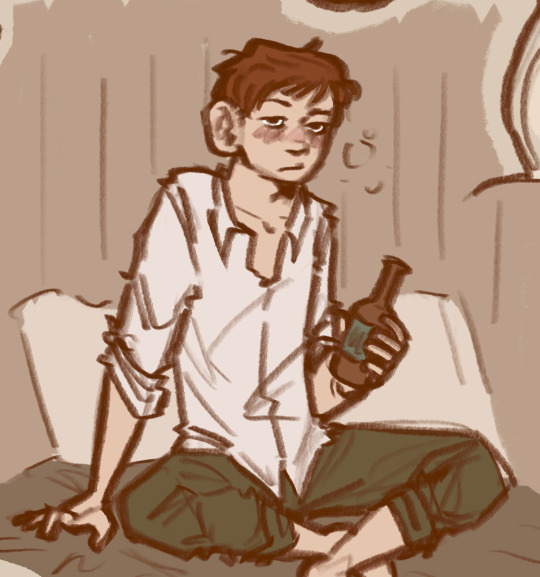
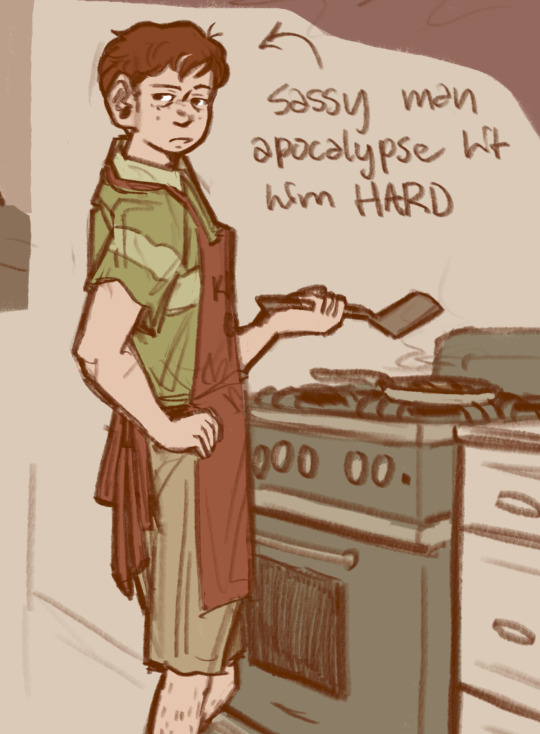


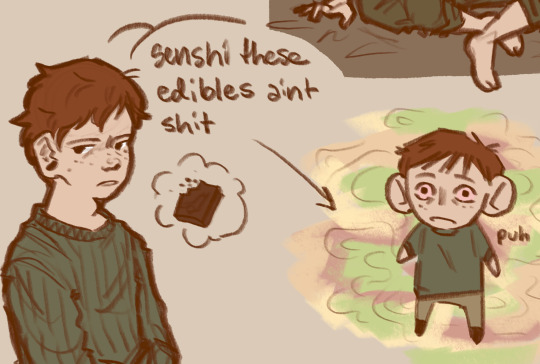
can yall guess my favorite character
#art#drawing#fanart#if tiktok is banned in america im moving here fully i like it here#dunmeshi#dungeon meshi#dungeon meshi fanart#chilchuck#chilchuck tims#hes my husband in the same way i call my friends pookie yk#like ive never related to a character more#i love him hes such a hater#the twitter discourse is something he started with rage bait#i need to study him
808 notes
·
View notes
Note
So I could be totally wrong but, I believe it was sort of expected that men/gentlemen lose their virginity before marriage in regency times. But I also there’s some fandom ‘debate’ about whether or not Mr Darcy would’ve had sex before getting married. So I was just curious about what your canon for Mr Darcy in T3W is. Is he a virgin or not?
I knew someone would ask me this eventually, haha. I've actually had really long conversations with my beta reader about this trying to figure it out. It sounds like this might all be stuff that you’ve already seen discussed in the fandom, but I’ve never thought about it deeply before and so these are new thoughts to me.
I keep going over the historical real-world likelihood, the authorial intent, and the text itself but I’m still not 100%. I’ll explain my thinking and what I find most likely, but here’s your warning that it’s not a clear cut yes/no.
Because on one hand, at that time period it was most common for men in his position to have seen sex workers or have casual encounters/mistresses with women from their estates. Though I do absolutely believe not all men did that, no matter how much wealth and power they had. To go back some centuries, William the Conqueror seemed to be famously celibate (no hints of male lovers either according to the biography I read) until his marriage, and there's no evidence of affairs after it either. The best guesses as to why are that it was due to his religious devotion and the problems that had arisen from himself being a bastard and not wanting to recreate that situation. Concerns over religion and illegitimate children would certainly still have been applicable in the regency to men who thought that way. And in modern times I've seen sex workers say that when an 18/21yo is booked in by his family/friends to 'become a man' often they end up just talking and agree to lie about the encounter. After all, it’s not like every man wants casual sex, even if they aren’t demisexual or something in that vein. But, statistically speaking, the precedent of regency gentlemen would make Darcy not a virgin.
On the other hand, just how aware was Jane Austen, the very religious daughter of a country rector, of the commonness of this? There’s a huge difference between knowing affairs and sex workers existed (and no one who had seen a Georgian newspaper could be blind to this) and realising that the majority of wealthy men saw sex workers at some point even if they condemned the more public and profligate affairs. The literature for young ladies at the time paints extramarital sex - including the lust of men outside of marriage - as pretty universally bad and dangerous. This message is seen from 'Pamela' and other gothic fiction to non-fiction conduct books which Jane Austen would have encountered. Here's something I found in 'Letters to a Young Lady' by the reverend John Bennett which I found particularly interesting as it's in direct conversation with other opinions of the era:
"A reformed rake makes the best husband." Does he? It would be very extraordinary, if he should. Besides, are you very certain, that you have power to reform him? It is a matter, that requires some deliberation. This reformation, if it is to be accomplished, must take place before marriage. Then if ever, is the period of your power. But how will you be assured that he is reformed? If he appears so, is he not insidiously concealing his vices, to gain your affections? And when he knows, they are secured, may he not, gradually, throw off the mask, and be dissipated, as before? Profligacy of this kind is seldom eradicated. It resembles some cutaneous disorders, which appear to be healed, and yet are, continually, making themselves visible by fresh eruptions. A man, who has carried on a criminal intercourse with immoral women is not to be trusted, His opinion of all females is an insult to their delicacy. His attachment is to sex alone, under particular modifications.
The definition of a rake is more than a man who has seen a sex worker once, it's about appearance and general conduct too, but again, would that distinction be made to young ladies? Because they seem to simply be continuously taught 'lust when unmarried is bad and beware men who you know engage in extramarital sex.' As a side note, Jane Austen certainly knew at least something about the mechanics of sex: her letters and literature she read alludes to it, and she grew up around farm animals in the countryside which is an education in itself.
We can also see from this exert that the school of thought seems to be 'reformed rake' vs 'never a rake' in contention for the title of best husband, there's no debate over whether a current rake is unsuitable for a young lady. And, from Willoughby to Wickham to Crawford, I think we have a very clear idea of Jane Austen's ideas of how likely it is notably promiscuous men can reform. This does not preclude the possibility that her disparaging commentary around their lust is based more on over-indulgence or the class of women they seduce, but it's undoubtedly a condemnation of such men directly in line with the first part of what John Bennett says so it's no stretch to believe she saw merit in the follow-on conclusions of the second part as well. Whether she would view it with enough merit to consider celibacy the only respectable option for unmarried men is a bit unclearer.
I did consider that perhaps Jane Austen consciously treated this as a grey area where she couldn’t possibly know what young men did (the same reasoning is why we never see the men in the dining room after the ladies retire, etc) and so didn't hold an opinion on men's extramarital encounters with sex workers/lower-class women at all, but I think there actually are enough hints in her works that this isn’t the case. Though, unsurprisingly, given the delicacy of the subject, there’s no direct mention of sex workers or gentlemen having casual lovers from among the lower-classes in her texts.
That also prevents us from definitively knowing whether she thought extramarital sex was so common, and as unremarkable, as most gentlemen treated it. But we do see from her commentary around the consequences of Maria Bertram and Henry Crawford's elopement that she had criticism of the double standards men and women were held to when violating sexual virtue. Another indication that she perhaps expected good men to be capable of waiting until marriage in the way that she very clearly believed women should. At the very least, a man who often indulges in extramarital sex does not seem to be one who would be considered highly by Jane Austen.
She makes a point of saying, in regards to not liking his wife, that Mr Bennet “was not of a disposition to seek comfort for the disappointment which his own imprudence had brought on, in any of those pleasures which too often console the unfortunate for their folly or their vice.” This must include affairs, though cheating on a wife cannot be a 1:1 equivalent of single young men sleeping around before marriage. However, the latter is generally critically accepted to be one of the flaws that Darcy lays at Wickham’s door along with gambling when talking about their youth and his “vicious propensities" and "want of principle." Though this could be argued that it’s more the extent or publicity of it (but remembering that it couldn't be anything uncommon enough that it couldn't be hidden from Darcy Sr. or explained away) rather than the act itself, or maybe seductions instead of paying women offering those services. I also believe Persuasion mentioning Sunday travelling as proof of thoughtless/immoral activity supports the idea that Jane Austen might have been religious enough that she would never create a hero who had extramarital sex.
So, taken all together this would make Darcy potentially a virgin, or, since I couldn't find absolute evidence of her opinions, leave enough room that he isn’t but extramarital sex isn’t a regular (or perhaps recent) thing and he would never have had anything so established as a mistress.
I’ve also been wondering, if Darcy isn’t a virgin, who would he have slept with? I’ve been musing on arguments for and against each option for weeks at this point. No romantasy has ever made me think about a fictional man's sexual habits so much as the question of Darcy's sexual history. What is my life.
Sex workers are an obvious answer, and the visits wouldn’t have raised any eyebrows. Discretion was part of their job, it was a clean transaction with no further responsibilities towards them, and effective (and reusable, ew) condoms existed at this time so there was little risk of children and no ability to exactly determine the paternity even if there was an accident. It was a fairly ‘responsible’ choice if one wanted no strings attached. In opposition to this, syphilis was rampant at the time, and had been known to spread sexually for centuries. Sex workers were at greater risk of it than anyone else and so the more sensible and risk-averse someone is (and I think Mr Darcy would be careful) the less likely they would be to visit sex workers. Contracting something that was known as potentially deadly and capable of making a future wife infertile if it spread to her could make any intelligent and cautious man think twice.
Servants and tenants of the estate are another simple and common answer. Less risk of stds, it can be based on actual attraction more than money (though money might still change hands), and is a bit more intimate. But Wickham’s called wicked for something very similar, when he dallies (whether he only got to serious flirting, kissing, or sleeping with them I don’t think we can conclusively say) with the common women of Meryton: “his intrigues, all honoured with the title of seduction, had been extended into every tradesman's family.” And it isn't as though Wickham had any personal duty towards those people beyond the claims of basic dignity. Darcy, who is shown to have such respect and understanding for his responsibilities towards the people of his estate and duties of a landlord, would keenly feel if any of his actions were leading his servants/tenants astray and down immoral paths. Servants, especially, were considered directly under the protection of the family whose house they worked in. I think it's undoubtable that Mrs Reynolds (whose was responsible for the wellbeing - both physically and spiritually - of the female servants) would not think so well of Mr Darcy if he had experimented with maids in his youth. It would reflect badly on her if a family entrusted their daughter to her care and she 'lost her virtue' under her watch. Daughters/widows of others living on the estate not under the roof of Pemberley House are a little more likely, but still, if he did have an affair with any of them I can only think it possible when he was much younger and did not feel his duties quite so strongly. Of course lots of real men didn't care about any of this, but Darcy is so far from being depicted as careless about his duties that the narrative makes a point of how exceptional his quality of care was. Frankly, it's undeniable that none of Jane Austen's heroes were flippant about their responsibilities towards those under their protection. I cannot serious entertain an interpretation that makes Darcy not, at his current age, at least, cognizant of the contemporary problems inherent in sleeping with servants or others on his estate.
A servant in a friend’s house would remove some of that personal responsibility, but transfer it to instead be leading his friend’s servants astray and in a manner which he is less able to know about if a child did result. That latter remains a problem even if we move the setting to his college, so not particularly likely for his character as we know it… though it wouldn’t be unusual for someone to be more unthinking and reckless in their teenage years than they are at twenty-eight so I don’t think having sex then can be ruled out. Kissing I can much more easily believe, especially when at Oxford or Cambridge, but every scenario of sleeping with a lower-class woman has some compelling arguments against it especially the closer we get to the time of the novel.
Men did of course also have affairs with women of ranks similar to their own, though given Jane Austen’s well-known feelings towards men who ‘ruined’ the virtue of young ladies we can safely say that Darcy never slept with an unwed middle- or upper-class woman. Any decent man would have married them out of duty if it got so far; but if he was the sort to let it get so far, I think it impossible Jane Austen would consider him respectable. Widows are a possibility, but again, the respectable thing to do would be to marry them. Perhaps a poorer merchant’s widow would be low enough that marriage is off the table but high enough that the ‘leading astray’ aspect loses its master-servant responsibilities (though the male-female ‘protect the gentler sex’ aspect remains) but his social circle didn’t facilitate meeting many ladies like that. Plus, an affair with a woman in society would remove many layers of privacy and anonymity that sex-workers and lower-class lovers provided by simply being unremarkable to the world at large. It carries a far greater risk of scandal and a heavier sense of immorality in the terms of respecting a woman’s purity which classism prevented from applying so heavily to lower-class women.
I think it’s important to note here that something that removes the need to think about duties of landlords towards the lower-classes or gentlemen towards gentlewomen is having affairs with other men of a similar rank. But, aside from the risk of scandal and what could be called the irresponsibility of engaging in illegal acts, it’s almost certain that Jane Austen would never have supported this. For a devout author in this era the way I’m calculating likelihoods makes it not even a possibility. But if you want to write a different fanfiction (and perhaps something like a break-up could explain why Darcy doesn’t seem to have any closer friend than someone whom he must have only met two or so years ago despite being in society for years before that) it does have that advantage over affairs with women of equal- and lower-classes. I support alternate interpretations entirely – it just isn’t how I’m deciding things in this instance.
I keep coming back to the conclusion that, at the very least, Darcy hasn’t had sex recently and it was never a common occurrence. It wouldn’t surprise me if Jane Austen felt he hadn’t done it ever. Kissing, as we can see from all the parlour games at the time, wasn’t viewed as harshly, so I think he’s likely made out with someone before. But in almost every situation it does seem that the responsible and religious thing to do (which Jane Austen values so highly) is for it to never have progressed to sex. I also don’t think it conflicts with his canon characterisation to say that he wouldn’t regard sexual experience as a crucial element of his life thus far, and his personality isn’t driven to pursue pleasure for himself, so it’s entirely possible that he would never go out of his way to seek it. So, I’m inclined to think that the authorial and textual evidence is in favour of Darcy being a virgin even if the real-world contemporary standard is the opposite. (Though both leave enough room for exceptions that I’m not going to argue with anyone who feels differently; and even if you agree with all my points, you might simply weight authorial intent/textual evidence/contemporary likelihoods differently than I do and come to a different conclusion).
Remember that even if Darcy is a virgin this wouldn’t necessarily equate to lack of knowledge, only experience. There were plenty of books and artwork focused on sex, and Darcy, studious man that he is, would no doubt pay attention to what knowledge his friends/male relatives shared. Though some of it (Looking especially at you, 'Fanny Hill, Memoirs of a Woman of Pleasure') should NEVER be an example of appropriate practice for taking a woman's virginity. Darcy would almost certainly have been taught directly or learnt through exposure to other men talking to make sex good for a woman – it was a commonly held misconception (since Elizabethan England, I believe) that women had to orgasm to conceive. It would be in his interests as an empathetic husband, and head of a family, to know how to please his wife.
Basically, I’m convinced Darcy isn’t very experienced, if at all, and will be learning with Elizabeth. But he does have a lot of theoretical knowledge which he’s paid careful attention to and is eager to apply.
#sorry for how my writing jumps around from quoting sources to vaguely asserting things from the books I only write proper essays when forced#if anyone has evidence that Austen thought a sexually experienced husband was better/men needed sex/it's a crucial education for men/etc#PLEASE send it my way I'm so curious about this topic now#this is by no means an 'I trawled through every piece of evidence' post just stuff I know from studying the era and Austen and her work#so more info/evidence is always appreciated#I had sort of assumed the answer was 'not a virgin' when I first considered this months ago btw but the more I thought about it#the less I was able to find out when/where/who he would've slept with without running into some authorial/textual complication#so suddenly 'maybe a virgin' becomes increasingly likely#But the same logic would surely apply to ALL Austen's heroes... and Knightley is 38 which feels unrealistic#(though Emma doesn't have as much commentary on sex and was written when Austen was older so maybe she wasn't so idealistic about men then)#but authors do write unrealistic elements and it's entirely possible that *this* was something Austen thought a perfect guy would(n't) do#and if you've read my finances breakdowns you know I follow the text and authorial voice over real-world logic because it IS still fiction#no matter how deftly Austen set it in the real world and made realistic characters#pride and prejudice#jane austen#fitzwilliam darcy#mr darcy#discourse#austen opinions#mine#asks#fic:t3w#I'm going to need a tag for 'beneath the surface' but 'bts' is already a pretty popular abbreviation haha#just 'fic: beneath' maybe?? idk
112 notes
·
View notes
Text
From Student to Staff: The Adults Who Watched Him Break, Then Welcomed Him Back
Severus Snape didn’t just return to Hogwarts as a professor. He returned to a castle full of ghosts—not the ones who drifted through walls, but the ones who once looked through him. The ones who had titles, robes, and responsibilities. And Merlin, the way they smiled when he came back.
These weren’t strangers. These were his former teachers. The ones who watched him unravel—slowly, painfully, obviously. They saw the weight—emotional bruises no child his age should have been burdened with. They noticed the robes that hung too loose, the way his voice softened into nothing, the eyes that dulled year by year. And then, as if memory had been Obliviated, they greeted him with polite nods and teacups.
Let’s name them. Let’s drag the velvet curtain back. Let’s ask what they refused to.
🧙♂️ Albus Dumbledore — The Grand Strategist of Silence
He saw everything. The twinkle in his eye? That was calculation. Dumbledore knew Severus’ pain. Knew his background. Knew the Marauders were brutal, and knew exactly how Hogwarts worked for boys who didn’t shine the right way.
And what did he do? Nothing.
Not until the prophecy.
Not until Severus—broken and desperate—came crawling with regret.
Only then did Dumbledore offer protection. And even then, it wasn’t mercy. It was strategy. It was cost-benefit arithmetic.
He kept Severus close, yes—but not out of trust. Out of necessity. And in that same chessboard logic, he raised Harry the same way. A pawn to be protected, yes, but only until it was time to be sacrificed.
Severus recognised it all too well. The same cold detachment Dumbledore had shown him as a man—keeping him close, not out of care, but for utility—was now being applied to Harry. Despite the tangled mess of resentment and reluctant protection he felt toward the boy—born of Lily, shaped by James—Severus could see the pattern. He could see the purpose.
He saw through it: "You've kept him alive so that he can die at the proper moment. You've been raising him like a pig for slaughter!"
Two lives. One broken young, the other burdened late. Both groomed to serve, both shaped for sacrifice—and in the end, perhaps, both meant to die on cue.
And when the war ended, Dumbledore offered Severus a position—not because he sought to make amends, but because it served a purpose. Severus had returned to spy, initially under orders, a reluctant shadow caught between masters. And once the mask was worn long enough, Dumbledore simply let it stay.
As if a professorship could heal years of sanctioned cruelty. As if being called "Professor" would cleanse the memory of being a punchline in the corridor.
⸻
🧪 Horace Slughorn — The Collector of Potential
He loved talent. But only when it glittered.
Slughorn praised Severus’ brilliance in Potions—called him promising, sharp. But he never once shielded him.
He didn’t invite him to the Slug Club. Not until Severus’ name meant something. Not until his mind could decorate a shelf.
Slughorn’s affection was conditional. You had to be charming. Presentable. A legacy. And Severus? He was none of those things. Just a poor boy with a hungry mind and no surname to flaunt.
And perhaps that is why, years later, Severus held nothing but quiet disdain for him. Because if anyone should have noticed what was happening in the shadows of Slytherin House, it should have been its Head. Not McGonagall. Not Dumbledore. Slughorn.
He should have seen it first. And yet—he didn’t.
Slughorn used him on parchment, but never sat beside him in reality.
⸻
🐈⬛ Minerva McGonagall — Sharp-Eyed and Selectively Blind
Minerva loved her lions. James Potter was golden in her eyes—brave, brilliant, bold.
She watched him torment Severus in broad daylight. She called it mischief. At best, she scolded. At worst, she said nothing.
She taught Severus Transfiguration. She saw his talent. But she never once stepped in when he was dangling upside down in a public corridor.
And years later? She called him Severus. Perhaps it was meant as respect. Perhaps it was all she had left to give. But even that name, spoken in her steady voice, must have tasted hollow.
Because if I were Severus, I don’t know what I would feel beneath the careful nods and professional courtesy. Not really.
Respect? Yes. She was formidable, fair—in her own way. But also a bystander. A witness to pain who never raised her wand.
The bitterness would have settled in strange places. Not hatred. Not fury. Just that sharp ache that lingers when someone could have helped—and chose not to.
As if calling him by name could erase the silence that came before it.
⸻
📚 Filius Flitwick — Gentle, Brilliant, Absent
Flitwick was kind. Clever. Charms master of immense skill. The sort of professor whose praise felt like sunlight.
And yet—he kept to his corner. He didn’t speak up.
Severus wasn’t just a good student. He was exceptional. The sort of student whose talent should have lit up the classroom like a Lumos Maxima—quiet, focused, effortlessly precise. The kind of brilliance that doesn’t need to shout because it radiates.
He invented spells. Created incantations from scratch. If anyone in Charms class should’ve stood out like a blinking sign under a spotlight—radiating silent brilliance from the back of the room—it was him. You didn’t need him to speak to notice. You just had to be looking.
Surely Flitwick noticed. How could he not?
But maybe noticing brilliance wasn’t the same as seeing pain. Maybe house loyalty got in the way. Maybe the politics of Slytherin versus Gryffindor made it easier to stay silent.
Perhaps he thought it wasn’t his place. Perhaps no one ever taught the professors how to reach past a student's wandwork and into their wounds.
And so, in the silence between spells, a boy learned that even kindness could be hollow.
⸻
🌿 Pomona Sprout — The Kind Bystander
Warm, earthy, nurturing. That was Sprout’s image. A Hufflepuff’s dream.
But she, too, looked away.
Maybe she frowned at what she saw. Maybe she clucked disapproval over tea. But she never interrupted the hierarchy.
Not when Severus slouched through corridors like a shadow. Not when he withered a little more each autumn.
She believed in fairness—but not enough to fight for it.
⸻
🏥 Madam Pomfrey — The Healer Who Didn’t See
Out of all the professors, Madam Pomfrey may be the one I find myself most curious about. Not because she was cruel—she wasn’t. Not because she was blind—she couldn’t have been. But because if anyone should have noticed—it was her.
She could spot a fractured rib with a glance. She healed Quidditch injuries between spoonfuls of broth. Her hands were warm, her wards comforting.
And yet… she didn’t notice Severus returning each term thinner, paler, greyer?
No trace of curiosity when he flinched at loud spells? No quiet pause when he walked too carefully, too lightly—as if even the castle floors might punish him?
Did she not see the hex marks? The magical burns? Did she really miss the boy who never sought help unless he was near collapse?
Or perhaps... he hid it too well. Perhaps he wore silence like a second robe. Perhaps he'd already learned that pain, when visible, only made you more vulnerable. That vulnerability made you expendable.
But still—she was a healer. She would have known the signs. Malnutrition. Exhaustion. The long-term magical residue that clings to a child who’s been hexed too often.
Pomfrey, as matron, was in a position to notice it all—if he had come to her. But maybe he didn’t. Maybe he couldn’t. Maybe he knew better than to hope.
We know his home life wasn’t gentle. Tobias Snape, his father, was a drunk—furious, unkind, loud enough to silence the whole house. We weren’t shown every bruise or every scream, but we were shown the aftermath.
So when Severus came back each September—robes loose, eyes dimmed, voice flat—surely, surely she must have seen something. Anything. A flicker of concern. A whisper of doubt.
To be fair, we cannot fully blame her. Hundreds of students passed through her care. She healed what was asked, tended what was brought. Perhaps she was simply overwhelmed. Perhaps she assumed someone else would act.
But still… I can’t help but wonder.
She offered pepperup potions to those with sniffles. She wrapped bandages around bruised Gryffindors.
But Severus? The boy who never asked, who needed most?
She offered rest to others.
But not to him.
⸻
They all had eyes. They all had wands. They all had duty—but they wore it like a decorative cloak, not a vow.
And oh, how one wonders. How could they not see the bruises? The shoulders pulled too tight? The voice too low?
How could a castle brimming with portraits, portraits that whispered and staircases that listened, miss the slow crumbling of a child?
Perhaps they did see. Perhaps that’s what makes it worse.
Because silence isn’t always ignorance. Sometimes, it’s a choice. Sometimes, it’s self-preservation masquerading as neutrality. Sometimes, it’s indifference dressed as decorum.
And still—they looked away.
Severus Snape returned to Hogwarts as a man.
But once, he was the boy they failed.
And they seated him at their table as if none of it ever happened.
#severus snape#snape meta#hogwarts meta#hogwarts professors#harry potter analysis#harry potter meta#pro snape#pro severus#hp fandom critique#canon discourse#character study#the boy who was never saved#wizarding world politics#anti marauders#dumbledore critical#slughorn critical#marauders era analysis#severus snape deserved better#snape fandom#fanned and flawless
124 notes
·
View notes
Text
I had a thought today about all that vampires lose in the twilight lore. Sure sure they’re fast and strong and invulnerable BUT they lose the chance to earn things because of that. The Cullens are rich but like…that just happens when you invest for three centuries. They can lift incredible amounts of weight…but just by nature and not because they’ve built up to it. They build projects and make paintings and learn…but they will always lack the satisfaction that comes from managing those accomplishments amidst the regular demands of life. Edward was seventeen…he never got the chance to earn anything by the sweat of his brow or the burning of the midnight oil.
Beyond just the bloodlust, they miss out on the regular daily challenges that make our time and pleasure meaningful. Something that is easily overlooked by teenagers reading a love story but honestly something heartbreaking to contemplate.
#twilight#the twilight saga#edward cullen#tts#tts discourse#to be clear I don’t think this robs them of all opportunity for meaningful work#but simply that our flow of time is dictated in some large degree#by the difficulty of the tasks we pursue and the effort made#also our brains are not wired to live without physical effort it makes you crazy#and it just seems like a form of torture to me now (as an adult)#to run great distances without ever getting tired#to read and study with perfect recall and no effort required to master the subject#to be removed from all the essential rhythms of daily life permanently…I do think in actuality all vampires would end up insane#it would break anyone
123 notes
·
View notes
Text
Wasn't quite in the headspace today to be postin', but the New York Times had to drag me to my keyboard by publishing an article about "The rise of otaku". An article on otaku! In the Year of Our Lord 2025!!
It isn't that you can't do that, of course - the thesis about how Japan's otaku approaches to fandom grew to dominate the wider world is a perfectly valid one to discuss. But if you do, you need to grapple with the cultural detritus the West has accumulated about "otaku culture" over the years, and it does not reach that bar. It isn't "cringe", it isn't obviously wrong, but it is stuck in the past. Take the headshot you can see above of a 単眼面/Tanganmen, or "one-eyed mask". The author is using it to showcase the ~crazy things~ people in Japan who are into anime-adjacent stuff do. In other words, the Weird Japan trope, where for complex reasons niche one-off things done by influencer-types or media companies in Japan get transported to the West to be used as symbols of Japan's "alt" culture. So while in English searching "tanganmen" throws up Vice articles, in Japan the creator of these masks Ozawa Dango has 6000 followers on Twitter:

She first made them in 2012, and while like props to her for keeping an art project alive, the source the NYT uses is an article from 2019, 7 years later - which is itself from 6 years ago! This isn't a "thing" in Japan, it is not a relevant part of otaku culture, and I think having it be front billing here is deceptive. I have a similar-if-less-intense reaction to the usages of the classic "otaku room photos" in the article:


This does reflect a real phenomenon, for sure, but for one the first photo is from 2014, and the second from 2019. In fact, none of the photos in the article are from the 2020's at all - a serious problem for a discussion of a youth pop-culture-focused movement. But let's take that first photo - it is from Shiori Kawamoto's 2014 “Daraku Room” book. Did you notice, like I did, that our girl is, well, really hot? Like way too hot to be that devoted to moe yuri series YuruYuri? For context, let's look at some other photos from that book!


Thanks, JapanTease.net! I can't tell you where this book ranks on the gravure-scale, I don't own it, but I can promise you is not zero. That girl might actually be a massive yuri manga fan, I won't judge, but the point is that pulling photos from a softcore porn glam book to stand-in for otaku is not what we in the statistics business call a representative sample. Like the one-eyed mask, this isn't real otaku at all.
Okay, enough photo dunks, let's get into the text. Those dunks are relevant, of course; they play on older tropes about Japan, "Weird Japan" and the "Otaku Room", and that problem continues throughout the article. First up, we have foundational quotes from Susan Napier, who is something of a trope herself as the first American academic to publish serious-yet-accessible works about anime starting in the 1990's. I am not a fan of her work, as she constantly tries to draw overly ambitions and serious social and historical connections between anime and the world, and we see that on display here:
[She] traces the origins of the otaku to the Edo period. Beginning in the early 17th century, sanctioned red-light districts known as pleasure centers were built in Tokyo, Kyoto and Osaka as sites for courtesans to entertain men; other areas were designated for enjoying Kabuki theater. “You had the development of a fan culture with people who loved a particular courtesan or actor.”
Strictly wrong? No - but Edo's red-light districts did not invent the idea of a celebrity, let's be real. That is a socially-universal concept that existed for centuries before then across the globe, and it didn't really lead to otaku (a very modern phenomenon) in any causal way. But it makes it sound more distinguished, more artistic, the way 2000's fans of anime in the west wanted their hobby to look.
That temptation to universalize cuts a different way too - lumping too much under the "otaku" umbrella. Since it has that "otaku led the future of fandom" thesis, it wants to label everything from themed Shinjuku bars to Lolita as "obsessive otaku fandom" to sell you on that idea. However, while those concepts are linked, sure, are they the same phenomenon? When, as the article quotes, Marie Kondo calls herself an "organizing otaku", is she actually saying anything about creative fandom? Or is she making a joke, and she is just an interior designer/lifestyle guru like every country everywhere has had for decades? These comparisons obscure more than elucidate, because "otaku" culture was historically, by a large majority, composed of media otaku. Japan did not invent or export a model of people being devoted craftsmen or opening themed restaurants. What it did "export" was the idea of fandom-as-identity and fandom-as-creativity, which media fans in the relevant eras dominated.
A topic around which, admittedly, the article has a bit of a knot it can't untie; because it is an article about otaku that doesn't want to mention sex. Beyond Edo-era red-light districts, the only mention is from a gender lens:
Wong and others make a point to address what he calls “the elephant in the room”: an undercurrent of female sexualization that began with manga and which, in what’s still a rather male-dominated society, extends to the broader world of otaku
"Elephant in the room" guys it is the whole room. It is a whole city block! You mention Comiket - oh sorry, "Comic Market" - but delicately dance around how those "750,000 attendees" bought at least as many porn doujins. And unlike Marie Kondo this is foundational to how otaku cultural dynamics were formed, and how they spread - the erotic content was a core part of why everyone "showed up" in the early days. And it is how the media mix and fandom-creator model spread to other countries, building on extant communities writing fanfiction and making fanart zines. You could not mention this topic at all if you didn't want to, but if you are going to touch on "sexualization" you need to own its importance. I almost see this as a sort of memetic response; in the anime early days everyone bashed otaku as perverts. In the new, tolerant era of today the author doesn't want to engage with that, but they overcorrect by essentially ignoring it. You have to find the middle here if you want to understand the history.
Okay, okay, that is enough - I know this is a very "death of a thousand cuts" essay, there isn't like a core failed thesis. As the New York Times, articles like these both set the standard for narratives around a topic and reflect the standard ideas already out there, so it is frustrating for it to be so... ungainly, and I wanted to note that. Set the record straight, as it were. But I will admit it is better than it probably would have been a decade ago, it does reflect growth in the discourse. And it isn't like it has some straight up nonsen—
After the original series [Neon Genesis Evangelion] aired, his most passionate followers, disappointed with the final two episodes, pressured Anno to redo the ending in a subsequent film trilogy.
Are you FUCKING KIDDING ME there are practically storyboards for End of Evangelion in the show broadcast next episode previews oh sure fans had to pressure Anno to fulfill the dream of every anime creative to get a big movie budget and make millions of dollars doing what he wanted to do for the TV show anyway before they collectively shot the production schedule in the head what kind of ADV Films 90's mistranslated rag interview garbled by a 2000's Reddit post bullshit is this the NEW YORK TIMES is LYING ABOUT THE PRODUCTION HISTORY OF EVANGELION I will BREAK INTO YOUR GOD DAMN HOUS—
130 notes
·
View notes
Text
i see your "'does he want to lick my boots or chop off my hands' is a Nicki reference" and raise you "what if Armand's relationship with sex is so fucked that his two modi are total submission and 'don't touch me or I'll chop off your hands' and Louis is still clowning on his trauma" in this essay I will
#I'm not getting involved in the iwtv TV discourse I didn't avoid the ascended astarion drama to get sucked into this#So don't come at me with any of that 'who is the real villain' stuff please#They are all evil and they are all traumatized and I love all of them deeply#Armand#louis de pointe du lac#iwtv#iwtv s2#Iwtv s02e05#the vampire armand#louis iwtv#I am both aghast and fascinated by the fact that Louis called Armand a groomed bitch because holy shit Louis my girl#There's a dynamic TM here and I want to study it under a microscope#Just two traumatized bottoms traumatizing each other even further#I really hope they'll address how badly Louis handles Armand's trauma tho cause it's so cold#Look at me going I don't want to be part of the discourse and then writing a whole ass paper in the tags#loumand#interview with the vampire
329 notes
·
View notes
Text
Okay now that I've reblogged that one post...
Holy shit
Like, please understand me. This is how I already interpreted these relationships after reading Journal 3 but like
Wow Ford really was in a weird kinda complicated gay situationship with Bill and Fiddleford, huh? When he's all alone on Christmas in tbob he's all like "Oh yeah haha of course...of course. You have. Yeah. You have a wife, F. How could I expect you not to leave. I am totally not secretly hoping you'll turn around and come back to me, or that you'll even bring your family back here if you have to so I can see you. I'd retreat to my dreams but I haven't seen my muse in weeks and I miss him so badly. I'm so alone"
He and Fiddleford aren't even dating but it's hard not to get the light impression that this situationship is such that Ford kinda treats Bill like his comfort triangle from his head and dreams and Fiddleford like his comfort best friend in his lab. Like he's sad on Christmas that his boyfriends left him alone, you know? Of course it's definitely more complicated than just that, but they are dear companions to him
Or when Bill finally comes back and Ford is pissed
"You return now? After all of that, after me missing you so badly, almost dying, wondering if I'd dreamed it all up. You return now like it was no biggie? Did you ever mean the things you said? Did you not find some other scientist or some other big brain to talk up? Have you found someone else? Another partner?"
And then Bill, dodging the question was like "Funny you think I'm cheating on you as if you haven't been spending all that time with F. The side bitch. The third wheel. You've even considered telling him everything, even though you know he has second thoughts. Heh. A little birdie told me he dreams of shutting down the project even."
Leading Ford to be like "Aw hell how could I accuse my muse of such a terrible thing when I haven't been a saint. He's right! F has been much less motivated lately and I've just gotten so paranoid from the isolation. I'm so sorry for my baseless accusations."
I don't even have a lot to say I just love these three. Fiddleford put up with a lot of shit from Ford while also dealing with his own problems and trying to help him regardless, while Stanford saw him as a comfort and a good friend but ultimately someone who was of lesser mind than he and couldn't see things through his eyes, while Bill was in Stanford's corner actively making him worse and contributing to his isolation (trying to get him to drop Fiddleford and actively feeding his paranoia), while Stanford was seeing both relationships of his with stars in his eyes and rose tinted glasses because he refused to do some introspection
There's so much stuff that journal 3 and tbob added to the equation that's just bad/shitty all around. Can't believe Ford went through a double divorce/breakup despite not having ever been married (or, at least, despite not even officially dating them sorta)
The entire situation in the past is just tragic and hilarious and concerning all at once and that's what I like the portal trio for tbh
#gravity falls#tbob#the book of bill#fiddauthor#billford#journal 3#tbob spoilers#book of bill#book of bill spoilers#stanford pines#bill cipher#fiddleford mcgucket#i just be ramblin#for the record this post isn't really intended to be deep analysis or thought my brain is just running with thoughts after reading tbob#yesterday and I love them#there's just so much in that book#so much#And I think it's funny what Alex did making the situationship even more textual and honestly just adding more things in general that are#absolutely discourse starters#tbob is really good for character studying Bill and Ford#I don't have anything profound to say I just love the complexity and softness (at times) and toxicity of Bill/Ford/Fiddleford
270 notes
·
View notes
Text
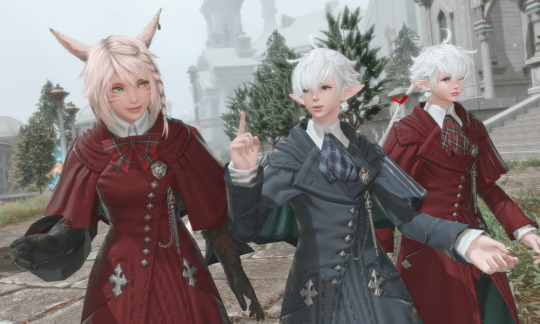
They're talking about the practical applications of their studies. Yanno, his statecraft and her swordcraft. Alisaie is majoring in 'Eye Rolling'.
#mine#verse: under-archon#ahru hiraeth#alphinaud leveilleur#alisaie leveilleur#the conversation is more like#[insert long diplomatic discourse]#“and then i'll hit 'em!”#(okay but in truth she studies warfare and the history of - which makes her a bit of an odd duck in sharlayan)#but she WOULD have better things to contribute 😂
54 notes
·
View notes
Text
Just don't think about Eddie growing up thinking he had to carry the weight of the world on his shoulders.
Don't think about Eddie taking on his dad's slack and being both a child and a coparent to his mother.
Don't think about Helena using him like a crutch as a child and rejecting him when he started growing into his own person.
Don't think about Eddie driving his sister around, trying to live as a normal teen. About Eddie and Shannon driving around El Paso, bounding about dreams of leaving Texas and discovering the world.
Don't think about teenagers pressuring them about sleeping together because of their friendship. About Shannon slowly falling for him, about the day she first kiss him and instead of feeling the spark he thought "Oh. I guess that's the next step."
Don't think about Shannon crying as she looks at her pregnancy test, about Eddie Catholic Guilt TM drowning in remorse because he thinks he's the monster that ruined her chance to be free from El Paso. About two teens being pressured by their families to marry, pressured to give up their freedom so their child wouldn't be a bastard. And they wouldn't be total disappointements.
Do not think about Eddie watching Shannon having a miserable pregnancy and choking on his guilt, about Eddie overhearing his parents talking being his back, about Eddie enrolling to over correct his wrongs.
Do not think about Eddie looking at a picture of his son everyday for months as they train him to hold a gun, to kill, to heal, to think like a soldier, to walk like a soldier, and to die like a soldier. As they train him to put a higher goal before himself, again. About Eddie still putting his son first despite his training.
Don't think about Shannon suffering for postpartum, exhausted and drained, trying her best at 19, 20, to take care of a kid who doesn't act like other kids, with Helena screaming in her ear she's doing everything wrong.
Don't think about Shannon resenting Eddie, but also resenting herself because who in their right mind feels jealous of a soldier.
Don't think about Shannon drowning in guilt when she gets Christopher's diagnosis.
Don't think about Eddie coming back with ghost in his eyes, but his father is so proud of his medal. Don't think about Shannon walking in on her husband staring at the wall while Christopher cries. His mind somewhere far away.
Don't think about Shannon waking up to one of her husband's night terror after their argument about his mother with tears in her eyes, crying herself back to sleep. Giving up because they live in a broken household and she can't do it anymore.
Don't think about Shannon dying when she finally thinks she can give herself and Eddie a new life here in LA, where they can co-parent but also heal, find their own identities because, Eddie we are free from El Paso. We left. We can be people now.
Don't think about Shannon dying. About Eddie grieving a wife both like a friend and an enemy. About Eddie asking himself what is wrong with him. Why isn't he not shattered, but why does he feel broken??
Don't think about Eddie seeing her in Christopher's smile, remembering the girl he used to dream with and the boy he used to be. Don't think about Eddie being haunted by her ghost, trying to navigate a grief of a particular flavour. A friend, a wife, a traitor, an adversary, a best friend, a mother.
Don't think about Eddie trying to do right by her, using his training to out himself as a second thought in his own life, trapping himself in responsibilities and guilt no one asked of him when Shannon wanted them to be free.
Don't think about her ghost watching the person Buck and the 118 helped bloom crack as Eddie chases her shadow in other woman. Don't think about her watching Eddie denying his personhood as punishment for failing as a father, when really, he's failing to grieve.
Don't think about Eddie Diaz going to El Paso to find his son, his baby, his light, but giving up in his sense of identity. Slowly turning into a Chimera of both his parents.
Don't think. It's late and I'm just saying shit.
#buddie#it'll late you'll forgive me i am on the toilet and feeling sentimental#911 abc#evan buckley#eddie diaz#buck x eddie#oliver stark#ryan guzman#911 discourse#911 show#shannon diaz#christopher diaz#el paso#character study#why the fuck is this so long??#they were just kids
88 notes
·
View notes
Text
🚨🚨🚨🚨CALLOUT POST🚨🚨🚨🚨
@annefrankwasbeautiful is a racist, antisemetic nazi bitch who should be blocked on sight, as well as seemingly illiterate, definitely brain-dead and just all around a lying cunt who gives Tumblr users a bad name through her shitty "keyboard warrior"-ism. Also, she cosplays punk culture despite being a trump supporter and also just and all-around shit human being.
#whump#whump prompt#whumpee#whumpblr#whumper#caretaker#ao3#archive of our own#fan fiction#fanfic#call out post#call out tw#callout culture#american idiots#ship art#shipping discourse#self ship#shauna shipman#shipping#naruto shippuden#redraw#crackship#crossover ship#style study#good omens#good morning#goodnight#goodtimeswithscar#good boy#very good
51 notes
·
View notes
Text
*holds Dean Winchester up by the scruff of the neck* listen, it's not that i think bottoming would fix him--his problems and disorders are way too far gone for that--but i do think that getting artfully maneuvered into trying it by the only other human on earth with a hope of understanding all his goddamn hangups, only to discover that he's been a winner of the "body wired to experience earth-shattering prostate orgasms" lottery this entire time, all while Sam oh-so-solemnly insists it doesn't have to Mean Anything about anyone's masculinity, lots of guys etc etc etc, and manages to radiate only moderate levels of smugness about the whole incident--
well, i simply think that even if that wouldn't fix him, it would either give him a vigorous shake and a ready-made excuse ("fuck it, why look a gift pleasure button in, uh, whatever orifice it came with?") to let a whole bunch of shit go, or it would drive him into even more insane depths of overcompensation. and either way, the Study That Man Like A Bug girlies get to feast.
#for some unholy reason there is honest-to-god 'my take is Correct and Mandatory' top/bottom discourse in the maintags these days#so here's my contribution. a heartfelt pitch for putting this guy in an ant farm and studying him (I Want That Twunk Obliterated edition)#if you are categorically opposed to even entertaining the idea then great news! no one's making you! my taste isn't the boss of anyone!#in which case may i cordially invite you to help your team pull its goddamn weight in the Just Fucking Scroll Past That Shit olympics#wincest#dean winchester#sam winchester#supernatural
169 notes
·
View notes
Text
Selective Loyalty and the Lily Problem
This post continues from my previous analysis, "WHO LIT THE MATCH?" — specifically section 5.) Loyalty Worn Two Ways, where I compared Lily Evans’ loyalty to that of Bellatrix Lestrange. The response to that post made it clear: we need to talk about Lily.
"She was written with strong loyalty." That’s what they say. But loyalty, when selectively applied, isn’t virtue — it’s comfort dressed as conviction.
Let’s talk about Lily Evans. The girl who stood up to bullies — sometimes. The girl who defended Severus — once. The girl who walked away — and never looked back.
🔨 The Double Standard No One Wants to Name
Lily called Severus’ Slytherin friends cruel when they hexed others.
"You think that’s funny?" she asked. "You think that’s all just a laugh?"
But when the Marauders hexed Severus in front of a crowd — dangled him upside-down, flashed his underwear to the world, humiliated him — it was brushed off as mischief. She scolded James, sure. Called him a “bullying toerag.” But she didn’t disown him. Didn’t stop speaking to him. She married him.
Why is one hex cruelty, and the other mischief? Why is one unforgivable, and the other… flirtation?
When Severus defended a fellow Slytherin, it became proof he was on the wrong path. When James hexed Severus, it was part of the journey to redemption.
Lily’s moral compass didn’t shatter — it shifted. And Severus saw it happen in real time.
⸻
🎭 The Performance of Principle
It wasn’t just the bullying. It was how she measured it.
Lily had the self-righteousness of someone who meant well — but only when it was safe to mean well.
She never went after Sirius, who cast the spells. She never called out Remus, who stood by and did nothing. She never looked James in the eye and said, “You humiliated my best friend and I won’t stand for it.”
Instead, she turned to Severus, and said:
“You’re choosing the wrong people.”
They all did. And yet only one was punished for it.
⸻
🔍 She Forgave James — But Never Severus
This is where the comparison starts to sting.
Lily was willing to believe James could change. But not Severus.
She gave grace to the boy who tortured her friend — but not to the friend who broke under pressure. She extended second chances to the boy she dated — but cut off the one who needed her most.
That’s not just a mistake. That’s selective loyalty.
⸻
⚠️ Not Villainy — But Still a Problem
This post isn’t about demonising Lily Evans. She was young. She was flawed. She was human.
But so was Severus.
And for a fandom that preaches kindness and forgiveness, it’s strange how selective that kindness becomes when his name enters the room.
⸻
♾️ Coming Full Circle
When Bellatrix was loyal, she was honest about it. When Lily was loyal, she chose who earned it — and who didn’t. One was mad. One was adored. But both were uncompromising.
Maybe that’s what makes it hurt.
Lily believed in goodness. Just… not always in the people who needed her to.
⸻
Related post: WHO LIT THE MATCH? Coming up next: The Devotion That Never Grew Up ⸻
If you found this post stirring, you may also like… A collection of emotional deep-dives into Severus Snape—the man who endured, unravelled, and remained:
Severus Snape: Widower of the Living
The Virgin Theory: Severus Snape, and the Sanctity of Unlived Intimacy
The Dignity of Suffering in Silence: Snape as the Ghost of a Living Man
#severus snape#anti snater#snily#anti snily#snily friendship#james potter#lily evans#hp meta#severus deserved better#fandom perspective#defence of severus#marauders#young severus#snape meta#severus snape meta#hp fandom critique#harry potter meta#hogwarts era#truth over nostalgia#character study#canon discourse#pro snape#bellatrix lestrange#fanned and flawless#marauders era#lily evans criticism#snape defence squad#snape apologists#bellatrix vs lily
81 notes
·
View notes
Text
i'm just thinking about arthur getting terrified of tommy when he broke down after the failed assassination of mosley and instead of approaching him and trying to reassure him, he sneakily took out the bullets of his gun while driving back to the mansion and let him roam wild in the field acting all suicidal. and by letting him run into the field alone at least he knows that tommy can't kill himself with an empty gun... it's batshit to me how his assumption of tommy killing himself turned out correct and he saved his life by emptying the gun...these two are so fucked up actually.
#like literally so traumatized it's devastating when you think of it#they grew distanced after 4 years it seems bc arthur would've never let him struggle alone and would've done something to comfort him afaik#what i'm saying is knowing arthur throughout the show he even becomes a menace to tommy to make sure he's alright#i'm sure there's a deeper meaning for how arthur acted so i'm still gonna need to do a pb character study rewatch#i really don't wanna jump into this but the way arthur always assumes tommy killing himself is wild to me like....#yk what i'll expand this discourse when i get to the s6 finale and what i think about arthur's farewell letter#peaky blinders#arthur shelby#tommy shelby#tommyarthur#thomas shelby#steven knight#pb text post
66 notes
·
View notes